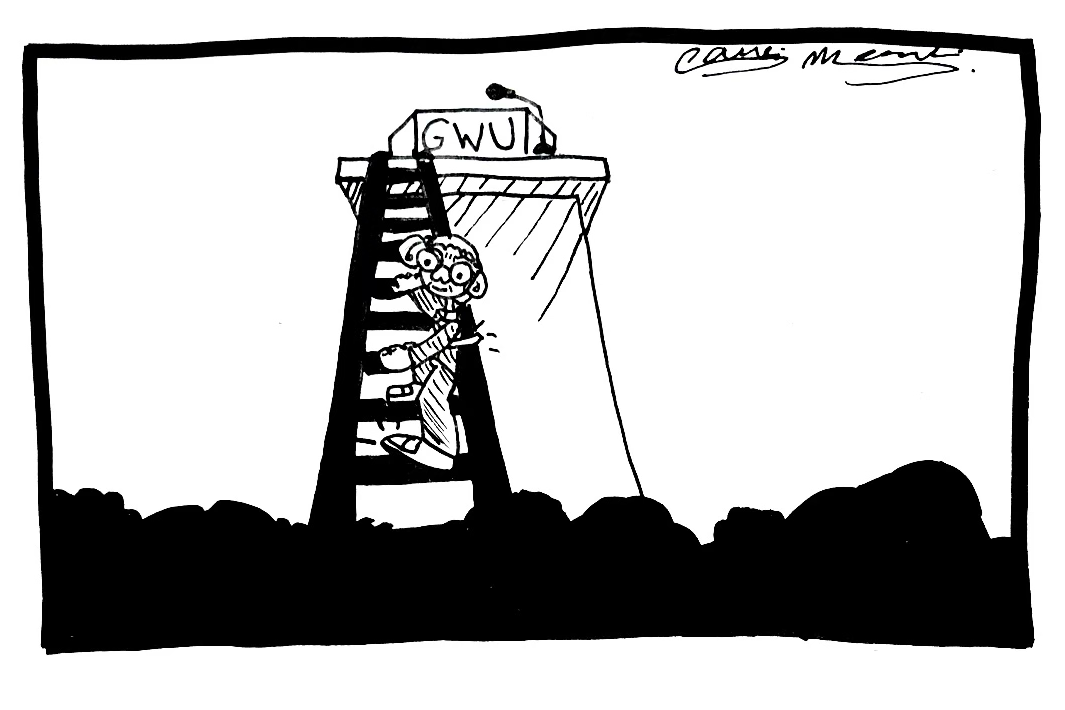It’s no secret that GW students are inseparable from politics to the point that it feels like republicans and democrats are only united by their curriculum. In Foggy Bottom and across the country, political polarization has split us into spiteful groups with little interest in our peers’ ideas. Instead of getting to know our enemies, we’ve resorted to stereotypes and assumptions meant to blunt challenges to our opinions. But even the most partisan students can start rebuilding a foundation for compromise and coexistence.
We don’t actually know who or what we’re disagreeing with, but we’re dead set on our own beliefs. Respondents in a 2015 poll of democrats, republicans and independents said they believed that 38 percent of republicans make more than $250,000 and that nearly a third of democrats were part of the LGBTQ+ community. The correct numbers for each statistic are two and six percent, respectively. You can’t argue with a made-up opponent. We’re totally ignorant about the people with whom we claim to disagree.
Across the country and on campus, we tend to view the opposing group more like an enemy than an alternative because of that ignorance. A majority of democrats and republicans view members of the opposing party as a serious threat, and members of both parties have increasingly perceived one another as “immoral” since 2016. Seventy-seven percent of Americans called the country “more divided than before the outbreak” of COVID-19, according to a 2020 Pew Research Center study. And half of Americans at least somewhat agree that a civil war will happen “in the next few years,” according to a separate study by the University of California-Davis’ Violence Prevention Research Program this summer.
So what is the source of all this ignorance? Political identity has taken on a life of its own as our personal identities and political preferences increasingly overlap. GW students – and Americans more broadly – have shifted into distinct groups based largely on political issues. Whether they self-identify as democrats, independents, socialists, republicans or something else entirely, students can’t change how political parties operate. But we can and should tweak our approach to politics – we must acknowledge the merits of an argument beyond our opinion of its arguer.
Instead of letting politics subsume our identity, we should explain what we believe and why we believe it based on our own experiences. There are a plethora of positions to take on issues like abortion, immigration and climate change, and listening to others – even those with whom you disagree – can shift your own positions. A well-intentioned argument and a willingness to listen could make the difference between conservatives joining the global calls for environmental protection or liberals supporting stricter border control measures.
We don’t have to consume all the same news sources or follow the same Twitter accounts, but we need to occupy a shared political reality – we need to know what other people think, especially those with whom we disagree. While it’s commendable to stay true to your principles on any front, remember that you’re probably just as certain in your beliefs as your opponent. Instead of trying to change someone’s mind or disprove them in a viral moment, think of your argument as an addition to their understanding of politics. When you make an impression on their political conscience, they’ll be forced to consider your contentions every time they argue their own.
Besides peer-to-peer conversations, student organizations can encourage students to share their perspectives before we take shelter in our ideological bunkers. If you’re already involved in politics on campus, it’s worth poking your head up and seeing what the other “side” is up to. Whether you represent a major party or a minor one, your student organization could invite guest speakers – those you agree with and those you don’t – to campus for the benefit of yourself and your peers.
GW also has its own chapter of Bridge USA, a nonprofit organization dedicated to creating spaces for open discussions on politics across the ideological spectrum. Regular discussions on pressing political issues can help decrease polarization and lower the temperature of our rhetoric – when politics becomes less about blood sport and more about learning, everyone wins. At nearby George Mason University, Bridge USA’s events on topics like universal basic income and the effects of COVID-19 mandates on mental health have brought students together – we can do the same at GW.
Whether making groups in class, chatting in line at GW Deli or going out on the weekend, students on campus are eager to embrace their mutual diversity across the spectrum of beliefs and backgrounds. That shouldn’t stop when politics come into play. You don’t have to sacrifice your principles in pursuit of friendship, but we limit ourselves to only the most partisan perceptions of our peers when we fail to communicate our ideas with one another.
Matthew Donnell, a rising junior majoring in political communication and English, is an opinions writer.


